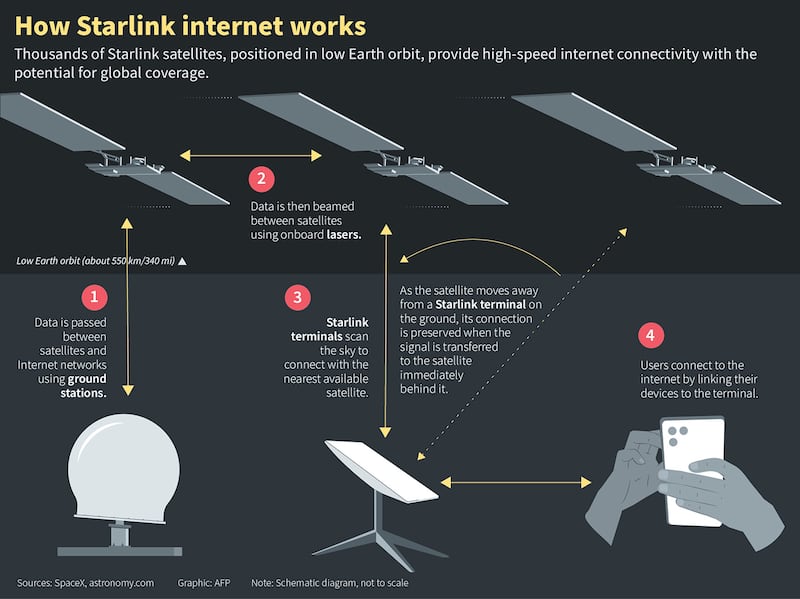Vietnam has passed legislation that would allow tech billionaire and senior U.S. presidential adviser Elon Musk’s Starlink telecommunications company to begin offering satellite internet services in the Southeast Asian country.
The decision by the National Assembly is unprecedented in that it allows the U.S. company to enter the Vietnamese market without requiring it to have a domestic partner.
Starlink’s parent company SpaceX had repeatedly expressed its intention to invest in the market of 100 million people but had not yet succeeded because the previous rules, which also forbade foreign companies from owning more than 49% of shares in joint ventures.
A person familiar with the matter told Reuters news service that the abrupt change in stance could be seen as extending an “olive branch” to SpaceX amid Vietnam’s concerns about tariff threats from U.S. President Donald Trump.
Critics acknowledged that the decision would pave the way for more Vietnamese to access the internet, but also warned that it would allow the government to more tightly control the people.

According to the VnExpress news network, the decision is part of a resolution on piloting a number of special mechanisms and policies to create breakthroughs in the development of science, technology, innovation and national digital transformation.
The resolution stated that the pilot is based on the principle of ensuring national defense and security, in which there is no limit on the percentage of foreign investors' share ownership, capital contribution or contribution ratio, and it would still maintain full ownership of local subsidiaries.
Promoting human rights?
Providing internet via satellite means that people living in remote and mountainous areas will be able to access the world’s vast knowledge and view uncensored information about democracy and human rights – which Hanoi’s critics say worries the government.
“The downside is that it helps the government control the people very effectively,” Nguyen Quang A, the former president of the Vietnam Association of Information Technology told Radio Free Asia, though he acknowledged it would help people by giving them more opportunity to express their opinions online.
The ruling also shows that the government is flexible when it comes to acquiring new technology, an information technology expert identified only by the pseudonym Phillip, for security reasons, told RFA Vietnamese.
Regardless of whether they access the internet via Starlink’s satellite internet constellation or by other means, users will still be bound by the rules of Vietnam’s cybersecurity law, which heavily regulates the internet and online activities, a resident with 10-years experience in tech security with experience at Vietnamese and international non-governmental organizations, told RFA.
“That means that telecommunications and Internet companies when opening up to Vietnamese users must place servers in the country, and the company will be responsible for providing all data when requested by the state.”
He said that Starlink would likely negotiate a deal with Vietnam’s Ministry of Information and Communications, but in the end “will have to give in and accept data requests,” in line with Google and Meta.
RFA attempted to contact SpaceX about the development, but received no response.
The Ministry of Information and Communications did not respond to requests for comment from Reuters news service.
Extending an “olive branch” to the US
A government official told Reuters a day earlier that the change paves the way for Starlink to launch in Vietnam and follows lengthy negotiations with SpaceX.
This is “a demonstration from Vietnam that they can play transactional diplomacy if the Trump administration wants to,” the previous Reuters source familiar with the situation said.
Nguyen Quang A told RFA that allowing Starlink into the Vietnamese market could help reassure the U.S., which had a trade deficit of US$123.5 billion last year, making Vietnam the United States' fourth largest trading partner.
Last September, Tim Hughes – SpaceX’s senior vice president –met with Vietnam’s general secretary To Lam during a business trip to New York, and expressed the company’s intention to invest US$1.5 billion in Vietnam but did not specify the timing and purpose of the investment.
IT expert Phillip said that the ruling presents an opportunity for Vietnam to be more open.
“Right now, we don’t know which companies will invest, what the policies will be, how much cooperation these companies will have with the government, but in my opinion, this is an opportunity for Vietnam to change and loosen up,” said Phillip. “If they want to be closer to the West, they have to loosen up a bit, they can’t completely control everything like before.”
Translated by RFA Vietnamese. Edited by Eugene Whong and Mike Firn.
